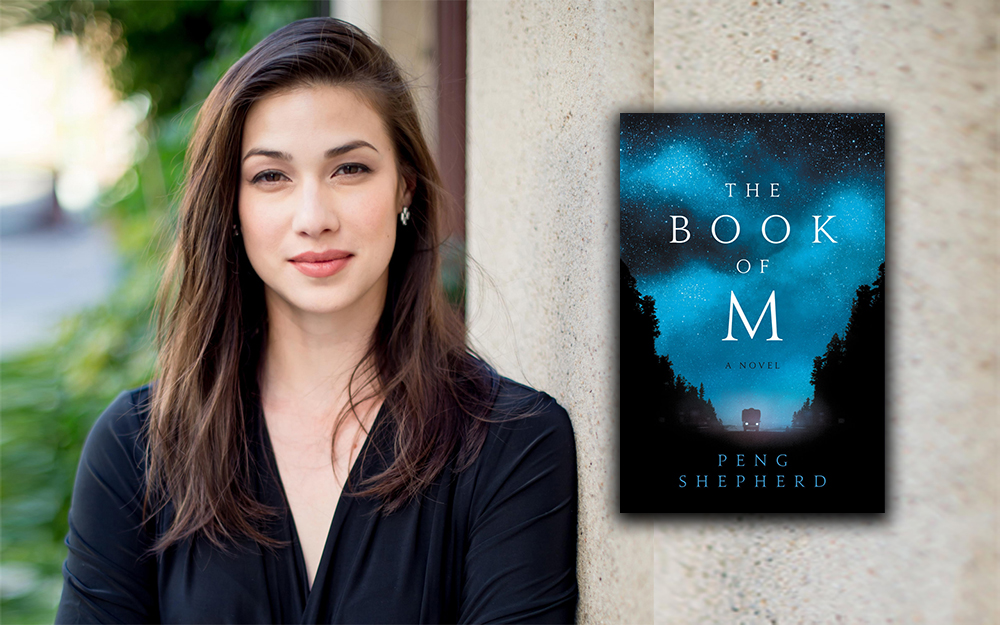
By Heidi Simmons
—–
The Book of M
by Peng Shepherd – Fiction
—–
Doctors have been working tirelessly to find a cure for Alzheimer’s, a mysterious and deadly disease that robs people of their memories then destroys life itself. In Peng Shepherd’s novel, The Book of M (Morrow, 489 pages) a global plague takes human memories and also their shadows.
Patient zero, the first person to lose his shadow, was in India. Doctors and scientists could find no explanation for the disappearance of his shadow, or the subsequent memory loss. In a short time, the man seemed to possess magical powers, changing environments and manipulating creatures. Although the magic was mostly harmless, people were understandably terrified.
The disease spreads across the planet and during a wedding reception in the United States, the country is locked down and a quarantine is established, leaving the bride, groom, best friends and family stranded in a luxury hotel where they take refuge for as long as they can.
Soon, conditions get worse in the hotel and around the city. Friends fall to the disease. Ory and Max, who met at the wedding, decide to take their chances and move to the wilderness where they believe they may be safer. And they are — for a time.
But, when they run out of food and Max loses her shadow, Ory makes the decision to leave her and search for much needed supplies risking that when he returns, she may not know him.
After he is beaten and robbed of his provisions, he returns to discover Max is gone. She has left with a tape recorder he gave her to help her preserve her memories. He gathers the last things he has to find her.
As Ory searches for the woman he loves, those with and without shadows confront him. It is a dangerous world. A strange cult has formed calling themselves the Transcendants believing in the magic of the “shadowless.”
There are also rumors of a cure in New Orleans and Ory hopes it may be true and he can find Max there. But first he must survive the wars and the journey.
The Book of M delivers a frightening post-apocalyptic world where the plague is not disfiguring or a virus spreading disease. People remain basically intact. It is their thinking that has been altered. They have lost the ability to reason. They can’t read or discern what is true and what is false. The best anyone can do is align themselves with those who think like they do and defend their positions believing it is correct.
I’m not sure author Peng set out to write an allegory of the current US Senate and Administration, but when I put this book down and considered the over-all theme, there were provocative connections. The majority of the story is set in Washington D.C. where the bloodiest battles are fought. It’s where the protagonist confronts the worst of the shadowless evil.
But beyond anything political, the horror of losing memory is arguably more terrifying.
The Book of M discusses what it might actually feel like to have Alzheimer’s. To loose not only your sense of self, but the ones you love and the feelings of joy that come with remembering happy and meaningful experiences.
Peng writes with great detail, sometimes too much. I didn’t need to know how Ory washed his penis. But she delivers on many levels. There are twists and surprises as the protagonist seeks the person he loves most. The story unfolds naturally and is filled with magical realism that gives the darkness of the story some much needed light.
There are two things I really appreciated about this story.
One, the women are all capable and independent people. They are wise, strong, brave, intelligent and fearlessly hold their own. They do what’s necessary to survive and help those they can along the way.
I also loved the patient zero character as he tried to understand his condition. When doctors put him together with an American amnesiac in hopes it might help, the two connect in a lovely way. Neither has a past nor do they have a grasp of what may be ahead. So they do they’re best to stay in the present and support one another.
There are things I didn’t completely understand such as how the disease spread. I can’t be sure of the magic that took place either, but the story delivers a profound sense of our need for human compassion, of belonging and how precious our memories are. With or without a shadow, the characters were all seen as human.
Do memories make us who we are?










































